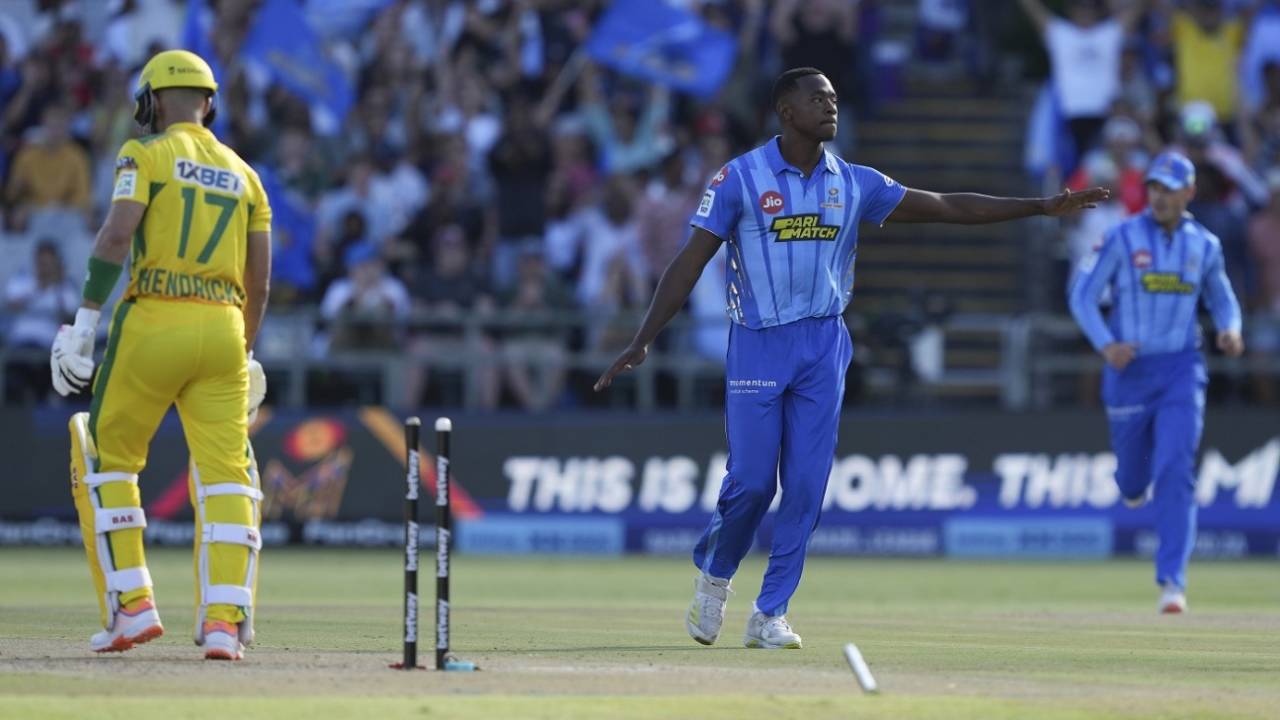Teams divided over SA20's provision of deciding playing XI after the toss
Captains can decide XIs after the toss from the 13 named before it, but Joburg Super Kings and Pretoria Capitals are yet to make use of the provision
Firdose Moonda
Jan 25, 2023, 5:43 PM
Super Kings' Stephen Fleming thinks the move provides "tactical advantage"; Capitals' Lance Klusener feels it "takes away skill of selection" • SA20
Four of the six SA20 teams have changed their XIs after the toss in line with the playing conditions that allows a captain to name 13 available players before the toss and whittle that down to 11 afterwards. That means teams were tinkered with in fewer than one-fifth of the 22 matches played so far, with the organisers conceding that the number is a little less than they anticipated, and team managements still trying to come up with ways to use this tactic to their advantage.
Allowing teams to change their combinations after the toss is a unique feature of the SA20, and was put in place to create a more even playing field. "One of the major reasons we did it was to try and lessen the impact of the toss on the outcome of the game, and create an opportunity for deliberation depending on whether teams are batting or bowling," Graeme Smith, SA20 league commissioner, told ESPNcricinfo.
Three of the four teams who have made changes to their teams have done so for exactly those reasons. Durban's Super Giants opted to include an extra spinner when they were asked to bowl first in their tournament opener against Joburg Super Kings, MI Cape Town did the same in their match against Super Kings at Newlands three days later, and Paarl Royals did it to swap out Ferisco Adams for Codi Yusuf against Sunrisers Eastern Cape.
In the same match, Sunrisers also changed their XI, but because of an injury to Tom Abell, who was replaced by Jordan Cox.
Super Kings and Pretoria Capitals are the two teams who have not made use of the provision yet, with both sides considering the move once the tournament resumes after the break due to three ODIs between South Africa and England, as more matches will be played on their home turfs. So far, these teams have played just two of their five home matches on the Highveld, with the bulk of the tournament having taken place in the Western and Eastern Cape at venues that host the Women's T20 World Cup next month.
In Cape Town, teams bowling first in day-night T20Is have won seven out of 11 games, which speaks to the ease of batting under lights and the need to strangle with the ball upfront. That is why when MI won the toss there against Super Kings and chose to bowl on a used strip, they also decided to include Afghan spinner Waqar Salamkheil in place of Duan Jansen, and it worked a treat. Salamkheil finished with 1 for 19 in four overs, and bowled Super Kings' senior batter Faf du Plessis out.
"It was the third game on that same wicket, so once we won the toss, we knew we wanted to bowl first and we knew we wanted to bowl in the day time," Simon Katich, the MI coach explained. "We felt with the difference between batting first and chasing, and [with] the way conditions have been a little bit uneven here in Cape Town, there was a chance to use it [the rule]. It gives you that flexibility around what happens with the toss."

When the tournament resumes, there will be nine matches between Centurion and Johannesburg, so teams may make more changes after the toss•SA20
His opposite number Stephen Fleming would have done the same thing if he could have, but their Sri Lankan offspinner Maheesh Theekshana had not yet arrived at the tournament. "If we had Theekshana, who arrives tomorrow, then we would have had the same idea," Fleming said at the time.
Since then, Theekshana has played in three of Super Kings' four matches, but they have yet to use the ability to change their XI. "We think there is minimal advantage," Albie Morkel, Super Kings assistant coach, said.
But that could change once matches are played up country, where the difference in day and night times temperatures is likely to cause dew. Then, the risk of spinners not being able to grip the ball as well as they would like to may encourage the team bowling second to include a seamer instead. When the tournament resumes on February 2, there will be nine matches staged between Centurion and Johannesburg, including both the semi-finals and the final, so teams may make more changes after the toss in those fixtures.
Overall, the jury is still out about this particular playing condition, with some most coaches feeling it offers a "tactical advantage", as Fleming put it. But some, like Capitals assistant coach Dale Benkenstein, think that could come more into play in the longer versions of the game. Others, like Super Giants' Lance Klusener, feel it "takes away some of the skill of team selection".
Firdose Moonda is ESPNcricinfo's South Africa correspondent
